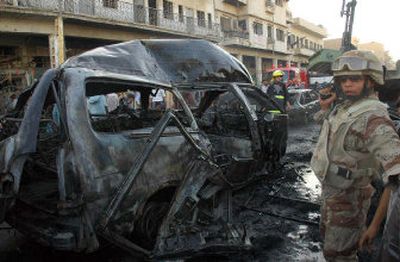Attacks kill at least 181 in Iraq

BAGHDAD, Iraq – Insurgents launched a barrage of attacks in and around the capital Wednesday and today that killed at least 181 people and wounded hundreds, marking one of the single deadliest days in the 2 1/2 year-old insurgency.
In a matter of hours, at least a dozen bombs were detonated throughout Baghdad, rattling windows and overwhelming the emergency rooms of the city’s hospitals with bloodied victims. The attacks appeared primarily to target Shiite civilians but also struck U.S. and Iraqi security forces.
The attacks continued today, when 16 policemen and five civilians were killed by a suicide car bomb in southern Baghdad. Twenty-one others were wounded, said Lt. Thair Mahmoud.
In the deadliest of Wednesday’s assaults, a suicide car bomber killed 112 civilians and wounded more than 200 others at a gathering spot for day laborers in a Shiite neighborhood in the northern end of the city, an Interior Ministry spokesman said.
Witnesses said the bomber lured some of the victims to his vehicle by announcing that he was looking for day workers. When the laborers rushed toward him with the hopes of being hired, the vehicle exploded.
“We just come with the hopes of making 10,000 dinar (about $7) for one day’s work,” said Raheem Zahir, 32, who suffered a minor head wound in the attack. “Instead, we have to face death.”
In a separate incident north of Baghdad on Wednesday, a group of gunmen stormed a home of the Tamimi tribe near Taji and abducted 17 young men. Soon after the kidnapping, the men were found executed in a nearby town square.
Other attacks in the capital included two other car bombings that killed at least 25 people, two car bombings that hit separate U.S. military convoys and wounded two Americans, and a car bomb that killed three Iraqi police, according to Iraqi and U.S. officials.
In a statement posted on the Internet, Al-Qaida in Iraq claimed responsibility for the string of suicide bombings, kidnappings and shootings. The statement, which could not immediately be verified, said the attacks were to avenge the joint military operation in Tal Afar by U.S. and Iraqi security forces last week to purge the northern city of militants.
In a tape recording posted on an insurgent Web site later Wednesday, a message purported to be from Al-Qaida in Iraq leader Abu Musab al-Zarqawi declared a “complete war” against all Shiites. The message said the militant organization would target Shiites “all over Iraq, wherever they stay and wherever they live.”
In Baghdad, Iraqi government officials denounced the insurgency and called the killings of civilians “barbaric.” Prime Minister Ibrahim al-Jaafari, who is traveling in the United States, vowed that the attacks would not deter Iraq from a path of democracy.
“Those criminals will not run away from our justice system. Our cities, our villages will not welcome them,” al-Jaafari said at a town hall meeting with Iraqi expatriates in Dearborn, Mich., The Associated Press reported. “This criminal act will unite the Iraqi people more and more.”
The attacks broke a relative calm in the capital and came at a key juncture for the fledgling Iraqi government. A national referendum on a permanent constitution for Iraq is one month away, and tensions between Shiite and Sunni leaders have been mounting amid differences over the charter.
The Iraqi government announced Wednesday that a draft of the constitution has been finalized and will soon be submitted to the United Nations for printing, so it can be distributed to households throughout the country before the vote.
In its present form, the document lacks the significant changes demanded by Sunni Arabs, who want any mention of federalism removed from the charter and the nation’s Arab identity clearly spelled out.
Sunni Arabs, who were a privileged minority in the former regime and make up the bulk of the insurgency, oppose creating autonomous regional governments. They fear federalism will weaken the nation’s central authority and result in Sunnis being cut out of the revenue produced by the oil-rich regions in the north and south, which are dominated by Kurds and Shiites.
Sunni leaders have called on their partisans to vote in the upcoming referendum to stop the charter from becoming law.
With such differences between members of the Shiite-dominated government and minority Sunni leaders over the constitution, there is growing anxiety in some quarters that the nation is moving toward an irreconcilable division and that the fresh violence could exacerbate those tensions.